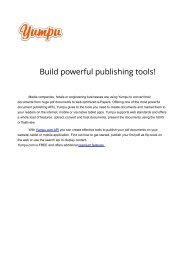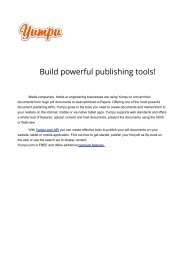test_pdf.pdf
Create successful ePaper yourself
Turn your PDF publications into a flip-book with our unique Google optimized e-Paper software.
MEETING<br />
TODA<br />
ODAY’S PROLIFERA<br />
ROLIFERATION<br />
CHALLENGES<br />
fed or well trained or well equipped as they would like. But, in short, you have a large and dangerous country on<br />
the verge of a significant nuclear weapon arsenal.<br />
They do have a failed system. Their economy is in tatters. Their political system has no legitimacy, does not<br />
satisfy or begin to satisfy the hopes or aspirations of their people. Their alliances are in tatters. The close relationship<br />
that they had in past regimes with both China and Russia, which still persist in some way, are not at all the<br />
kind of guarantor of their ultimate security as they once had.<br />
What do the North Koreans want? We don’t know. It’s hard to say. It’s not clear how many North Koreans<br />
know, or which of those that know count. What we do know— and what Bob always told us to do when we were<br />
working this problem last time is we don’t know what they want but we do know what they have and what they<br />
can do. And therefore, it seems that the proper policy perspective would be one that monitored their capabilities<br />
rather than relied exclusively upon an interpretation of their intentions to guide our policy.<br />
We do know that if they stick to their current glide path they’re going to either end up with more nuclear<br />
weapons or more bargaining leverage, or both, because as time moves on, that’s what’s happening. They’re<br />
getting more capable, and the more capable they become, the more they will seek to exact, by way of concessions,<br />
to give up what they’ve got. That’s just logic.<br />
The only way for us to truly find out what they are about is to force them to choose. We do know that they<br />
cherish their regime. We do know that they want regime survival. If we really want to <strong>test</strong> the proposition whether<br />
North Korea will or will not accept serious constraints upon its nuclear weapons capabilities, we need to force a<br />
choice between security of their regime and security of their weapons program. This we have not done.<br />
Our objectives—and when I say “our objectives” I think it’s fair to say those involved in the six-party talks<br />
all around—are clear. We want to see an elimination of the North Korean nuclear weapons program. From a U.S.<br />
perspective, there are certain parameters that have been levied on how that is achieved. One, there should be no<br />
blackmail; two, the process must be multilateral; and three, it must be irreversible.<br />
Now, at a very broad level, two of these parameters I think are quite unexceptionable. I don’t think we’d find<br />
anyone in this audience or elsewhere who would advocate subjecting themselves to blackmail or arguing for a<br />
unilateral solution, but I think we need to dig down at least one further level. I think in some measure the<br />
parameters as described reflect a misreading of history, which would be corrected if they read our book (laughter)<br />
but I think more importantly—and I will return to the question of prescription and get around the blackmail and<br />
multilateral issues—but irreversibility I think is a different kettle of fish.<br />
Irreversibility I think is a really a will-o’-the-wisp. On the one hand, it’s nice to have. On the other hand, by<br />
the time you get it you probably don’t need it. When you are talking about proliferation, as Joe and I argued years<br />
and years ago, you’re really playing for time. And the only way you truly get irreversibility is with profound<br />
political change that affects what I would consider the demand side of the proliferation equation. So you have<br />
irreversibility, I would submit to you, in Germany, in Japan, in South Africa, in Argentina. And I’ll take it. It’s the<br />
best nonproliferation that you can get. But in these harder cases—North Korea, Iraq, Iran—it’s not available<br />
really, and in any meaningful way, because any pledge that you get you’re going to have to monitor, and the<br />
political change that you seek is far too long in coming to help you on your nonproliferation problem.<br />
So if you take that as your status quo and where we are headed, we are left with a pretty clear and wellrehearsed<br />
set of options on how to address the problem. One is regime change. This was not one that was<br />
seriously considered in the way it’s now thought about a decade ago. The problem with a regime change is it’s the<br />
flip side of the irreversibility issue. It’s great. It is the most effective nonproliferation policy you can get. But it’s too<br />
slow and it’s too subject to elements outside of the control of diplomats. And in the case of North Korea, we have<br />
had a history of people predicting its imminent demise for years and years and years, many of whom have<br />
themselves passed from the world stage, even as the admittedly intolerant and totalitarian North Korean system<br />
has survived.<br />
Now, the only think I can think of that is worse than a North Korea with nuclear weapons is a collapsing<br />
North Korea with nuclear weapons because under those circumstances you not only have all the dangers you<br />
already have with proliferation but the further danger of a country that thinks it’s extremis and may be more<br />
inclined either to use [nuclear weapons] or to sell them to third parties. So regime change is not a very attractive<br />
option.<br />
Secondly, the military option. This was seriously considered a decade ago when we knew where the 8,000<br />
spent fuel rods were and when we believed that a red line against the separation of that plutonium was something<br />
the president should clearly consider and that it should be an option available to the president to take<br />
military actions in bombing or taking out the Yongbyon facility in order to eliminate the proliferation threat that<br />
the plutonium posed. We don’t have to talk much about that today because I think the option is gone. It would<br />
have been hard enough then to muster international support, beginning with our regional allies in Seoul and<br />
29<br />
29
















